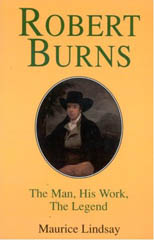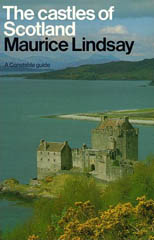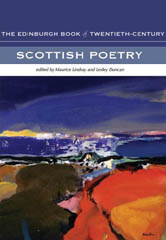Maurice Lindsay
Maurice Lindsay Interview
 When did you start collecting books?
When did you start collecting books?
When I was at school. Glasgow Academy offered three categories of lunch. The 8d lunch (old pence) consisted of soup and pudding, the 9d lunch was soup and meat, and the 1/3d lunch was soup, meat and pudding. My parents gave me 1/3d, but I always took the 8d lunch. At the end of the week I had quite a lot of money to go and buy second-hand books. The first Penguin books that came out only cost 6d in the 1930s, and so you can imagine that in the early 1930s to have 7d a day for books meant that as a boy I was able to accumulate a lot of them. I also remember having Fabré’s Book of Insects, and a rather worn, leather-bound 1780 edition of James Thompson’s The Seasons, which I kept until fairly recently.
What was Glasgow like for second-hand bookshops in those days?
There were a lot of them down the Great Western Road and Gibson Street. If you were feeling flush you could take the tram to John Smith’s where there was a marvellous second-hand books department in the basement. I was able to build up a great library of Scottish books. Nowadays that would be hard to do. Nearly twenty years ago I moved from Great Western Terrace to the country, and at that time I had 5,000 volumes; there wasn’t enough room in the new house, and so I sold about 2,000 of them. I’ve always had a big collection of books around me. I had a school friend whose father collected first editions, immaculately bound volumes of the Elizabethan dramatists. Which ones do you like best, I asked him. Oh, I don’t read them, I just collect them, he said. I couldn’t understand this. I thought the whole idea about books was to read them, to collect them for use. My books were all read.
Although you’ve written books on all sorts of subjects – Scottish literature, history, architecture, gardens and topography – it seems that your poetry matters most to you. When did you catch the writing bug?
I wrote verse when I was at school. On one occasion, the school magazine published a dreadful piece of about twelve lines. We had a very curious Latin master called ‘Foxy Clark’, and one day he said, Boys, your homework tonight is to learn Lindsay’s poem. When I got home I rewrote the second last verse. In class the next day he said, Lindsay, declaim your homework. (Being a Latin master he spoke that way). So I got up and declaimed my homework. He said, You have made two mistakes. You will be beaten. Though I explained that I had made revisions, he beat me anyway. But that didn’t put me off writing.
I was very keen on the poetry of A. E. Housman. At a time when young people of my generation were discovering Auden, MacNeice and Day Lewis, Housman too had a compelling impact on us – I still think he’s one of the most remarkable craftsmen there’s ever been. I’m not so keen on chaps getting hanged at the stroke of eight now as I was when I was young
… then it seemed very romantic. Housman does have a narrow range, but the music of the verse, the country imagery, the technique – superb!
Of course, everybody who’s written since 1930 has been influenced by Auden. He liberated the idea of what could be subject-matter for poetry:anything can be, as long as it’s handled properly. I never met Auden, but I met MacNeice in connection with broadcasting, and in some ways I liked his poetry better.
These were my early influences. Everybody begins by copying someone else, and then you find your own voice. My interest has always been in everyday life, the comédie humaine or whatever.
Creating poetry out of an accretion of small details of everyday life seems to be a major preoccupation of many of the younger writers at the moment. 
Carol Ann Duffy’s poetry really appeals to me. In general, I don’t like poetry that doesn’t appear to be poetry, that falls off the edge of the page. If you’re going to write free verse you have to create a tension from within. Huge quantities of what appears in the poetry magazines doesn’t do that.
On the other side of the scale, if metre and rhyme are rigid meaning might be subjugated to form.
In my own poetry, I make sure that every rhyme serves a purpose. The music of the thing presents itself. Half-way through writing a poem you may realise you’ve made a false start, abandon what you’ve done and start afresh. I don’t find strict form restrictive. In any kind of writing you have to do what Robert Graves called anvil work. You get an idea … in my case, it might be a remark that somebody makes or a line in a newspaper that I’d jot down … then when there were two or three related images and when I saw what I thought was the direction of these fragments, I’d sit down and do the anvil work. For the anvil work to be successful, it must look effortless afterwards. In a poem every single word must work, and the meaning must never be sacrificed for the sake of rhyme or for the sake of scanning, otherwise it’s phoney.
I started writing poetry seriously during the Second World War. You were never quite certain whether you’d be alive in a couple of month’s time or not, so people rushed into print far too quickly. There was an easy market then. I got caught up in that dreadful New Apocalypse movement.
Why dreadful?
I remember sending what I thought was a quite tolerable poem to a magazine called Fulcrum or Hinge or some such thing, and it wasn’t accepted. So I sat down and wrote the first nonsense that came into my head in free verse and sent that in under a pseudonym, and it was printed.
You reckoned what you’d written was nonsense. Absolute nonsense? Where do our standards to judge these things come from? Views are at such variance even within one society. There are so many different kinds of life experience and ways of expressing things. Do you think there’s such a thing as objectively ‘good’ art, or is it essentially a subjective preference?
I think that there is such a thing as objectively good art. Most people would agree that Leonardo da Vinci was much better than most at what he did. The same goes for Mozart and Shakespeare. The very fact that people want to look at, listen to or read their work over all these years is testimony to that. The idea that anything goes is one of the awful heresies of this creative writing lark nowadays.
Fashions do change. A. E. Housman is no longer in fashion – nor is Auden in vogue, for that matter, though there has been fresh interest in his work because of the film Four Weddings and a Funeral, in which a marvellous Auden poem, ‘Funeral Blues’, is read. I saw the film when I was in America in April. While I was there I bought the Collected Poems of James Merrill, because I was told he was now the greatest living poet in America. I wrestled with these two huge paperback volumes, and couldn’t understand a word. Then I went to the film and up came ‘Funeral Blues’. My spine tingled and I nearly leapt up out of my seat. That’s the real thing. To my mind, this other guy’s poetry is phoney and academic – it just happens to be a fashion.
The critic’s tool is objective comparison, and that objectivity requires perspective on the periodic variations of fashion.
As a poet you’ve written in Scots, English and Lallans. What decided these developments?
I came from a middle-class household where Scots was not spoken, although more Scots words were used than would be in the equivalent environment today. During the Second War, when I had the opportunity, I studied Scots. I read Dunbar and Henryson and MacDiarmid. I was bowled over by the early MacDiarmid. In 1943, Valda Grieve, MacDiarmid’s wife, was selling books in Lyons, a lovely gracious shop in Sauchiehall Street. I went in and bought for 6d first editions of Sangshaw, Pennywheep and A Drunk Man Looks at the Thistle. Though they had sold poorly, they had been allowed to stay on the shelves for more than ten years. I went on to meet MacDiarmid,and he wrote the Introduction to Hurlygush, my first book of poetry in Lallans.
Your main themes have changed substantially over the years.
As a boy I wrote about growing up and falling in love; after I married Joyce and we had children I wrote some poems about the family growing up, which fascinated me; then, for a time, I was involved with Scottish nationalism in a non-political way. The themes have grown out of what was going on in my life and the preoccupations of the moment.
How did you enjoy your experiences as a journalist?
Writing has always been central to my life, but the one thing I never wanted to have to do was the daily grind of newspaper journalism. I had a taste of that when I did two nine-month stretches as leader writer for the Bulletin.
 You were also music critic for the Bulletin, and as a radio journalist you were able to concentrate on music and literature. I gather you very much admire the work of composer Francis George Scott.
You were also music critic for the Bulletin, and as a radio journalist you were able to concentrate on music and literature. I gather you very much admire the work of composer Francis George Scott.
I first became acquainted with his work when I was in London in 1944. I found two of the five volumes of his Scots Lyrics, (printed by Bayley and Fergusson at Scott’s own expense). I wrote to Scott expressing my enthusiasm, and he sent back an enormous autobiographical letter, full of information about the early ‘Scottish Renaissance’. In it he makes the categorical statement that he sorted out the last two lines of ‘A Drunk Man Looks at the Thistle,’ which apparently annoys MacDiarmid’s biographer, Alan Bold.
My work as a broadcaster with the BBC, where I had a long collaboration with George Bruce, eventually led on to the job of Programme Controller for Border Television.
Talking about music and song, in Alias MacAlias Hamish Henderson takes you to task for saying that the living folk tradition is all but dead.
The reason I say this is because folk culture comes from the folk, not from Tin Pan Alley, or through television. The moment transmission through film, radio and television was started, the source was fouled. Half of what now passes as ‘folk’ has as much to do with it as country music has to do with cowboys in America. It’s a commercial style. I know that the School of Scottish Studies has unearthed some aged crones who do have authentic material. That’s one thing. But the stuff that Norman Buchan peddled is so polluted with commercialism, you can’t call it folk in any real sense. It is debased by the mass media. It’s unavoidable, just as a river can’t avoid pollution being pumped into it by a factory.
Was it ever such a clean river?
Yes, before automatic forms of transmission were invented in this century:you find in folk song all over the place the same themes cropping up. It was something that was self-generative in individual communities. What we have now is not genuine folk and is not interesting to me. Good collectors like Hamish are taping what’s left of genuine folk material, but to my mind, some crone of ninety creaking out a tune she knew when she was two, while sociologically interesting, is musically of no interest whatever.
This connects with issues about language. I’m thinking about writers like James Kelman whose stock-in-trade is urban Scots – which others describe as a debased and impoverished form of Scots.
Kelman’s writing in small doses is very interesting, and I was delighted when he got the Booker Prize. But at the end of the day many of his characters and their way of expressing themselves bore me. I admit the validity of what he’s doing, I just don’t think you can do it for very long without getting tedious.
One of your more recent poems describes with distaste the shouting and chanting of the crowd at a political protest rally in Glasgow. Is there any link between the feeling you express here and a childhood encounter with striking miners who overturned a bus you had been travelling in?
Possibly. On the whole I don’t think that violence gets anyone anywhere. Revolution produces counter-revolution. It seems to me that the minute man abandons reason he’s finished. I’m always on the underdog’s side, but I do not think that acts of violence are a solution. Look at what the French Revolution led to. Appalling. Murder and a dictatorship. Even worse with the Russian Revolution!
Are you a pacifist?
No. I was in the army. Nevertheless, in my opinion, the two worst inventions of mankind are religion and war. Once you get certainties, once people become convinced that they are right and only they are right and they’ll kill for it, human beings reduce themselves to insignificance. Although I’m temperamentally a happy person, at this point in my life I’m a bit disillusioned with humanity. The way that we carry on is pretty terrible.
But there you are. You have to stay hopeful.
© Jennie Renton 2006

Comments